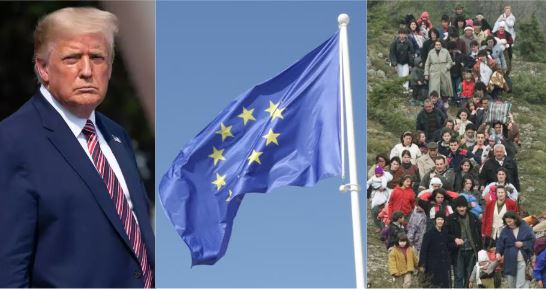The European Union is failing everywhere and giving more and more space to Beijing in order to exercise influence in areas that were traditionally seen within the West’s sphere of influence. Not only is the EU failing to play an impactful role, but it is also holding back the United States. Case in point being the Kosovo conflict concerning Serbia in the Western Balkans.
Recently, Kosovo President Hashim Thaçi and Serbian President Vučić were supposed to meet at the White House as the US offered its good offices. But then the Specialist Prosecutor’s office at the Hague announced that it had pressed charges over allegations of war crimes against Thaçi, triggering a wave of speculations that the European Union was trying to derail the Washington-backed dialogue between the two leaders.
After the White House talks failed to materialise, the Kosovo President and Prime Minister Avdullah Hoti met the European Commission President Ursula von der Leyen instead. Due to such incidents, the Western influence in the Balkan Peninsula is getting eroded, creating more space for Beijing to play the leadership role in this part of the world.
At the root of the matter is the Kosovo conflict. The Republic of Kosovo remains a partially recognised country after the Albanian-majority Republic declared independence from Serbia in the year 2008. This was preceded by the long-standing tensions between Kosovo’s Albanian and Serb communities that had ultimately led to the Kosovo war in 1998 and 1999.
Western Europe and the United States are both in favour of an independent and sovereign Kosovo. In fact, led by the United States, the NATO had bombed Serbian military targets for 78 days starting March 24, 1999.
Today, 97 out of 193 countries in the world recognise Kosovo as an independent, sovereign country. Serbia has, of course, refused to recognise it as a sovereign state. It is not recognised by several powers such as India, China, Russia and Brazil.
But it is not as if the US and other Western powers are the only ones dictating terms in the Balkan Peninsula.
The Western Balkans sit in between the Eastern and Western powers of the world. This has been a region of a power struggle between the ideological competitors on the East and the West of the Peninsula. Serbia is no exception. Firstly, Russia and now China wants to occupy greater space in Serbia.
Traditionally, Russia has exercised a lot of influence on Serbia due to historical and cultural reasons. Of late, Russian influence has started towering due to Moscow’s unwavering support to Belgrade over the Kosovo issue. Putin is the most popular foreign leader in Serbia.
And Russia is not the only roadblock. China, which is expanding its global footprint and eating into what was once considered Moscow’s exclusive sphere of influence, is spreading its tentacles into Serbia also. The Chinese investments are expanding in Balkans too. All the Balkan countries are members of Chinese President Xi Jinping’s Belt and Road Initiative (BRI).
Naturally, the focus of China’s BRI ambitions in the Balkan Peninsula has been the Western Balkans. Bosnia and Herzegovina, Montenegro, North Macedonia and Serbia have all received extensive loans from Beijing under the BRI. Serbia alone has secured 4 billion US dollars in investments and 5 billion US dollars in loans from Beijing, apart from infrastructure projects.
Moreover, Serbian President Aleksandar Vučić is not very fond of European values. He has an authoritarian streak that drives him further away from the West.
It is largely in the interest of both Brussels and Washington to achieve the goal of Kosovo independence. Their long-term goal has to be persuading Serbia into formally recognising the Republic of Kosovo. But the European Union and the United States seem divided on how this goal is to be achieved.
The dominant view within the EU is that Serbia should be persuaded with incentives to accept the status quo and recognise the Republic of Kosovo. What the EU doesn’t realise is that Serbia is not very keen on accepting European initiatives at a time when China is already investing heavily in the country.
Moreover, Vučić will not be able to accept the status quo even if he wants to because Russia and China will be exercising their overwhelming influence and soft power in the country. The most that he can manage is a compromise that entails some quid pro quo from both sides- Pristina and Belgrade.
Also, the EU must start by counteracting increasing Chinese investments. What EU can consider is aid programmes rather than funding governments, so that its influence and soft power can increase in the Western Balkans.
But currently, the EU is not calling the shots in Serbia, nor is it letting the US do so. The Trump administration is more flexible and is ready to encourage “mutually satisfactory settlement” between Kosovo and Serbia that might consist of border adjustments and a land swap transferring four Serb-majority municipalities to Serbia.
Whichever nation brings an end to the Kosovo dispute will gain a lot of influence in the Western Balkans. Trump knows this and wants to keep China at bay by striking a deal between Kosovo and Serbia. However, the EU’s incoherent policy is turning out to be the biggest roadblock.
